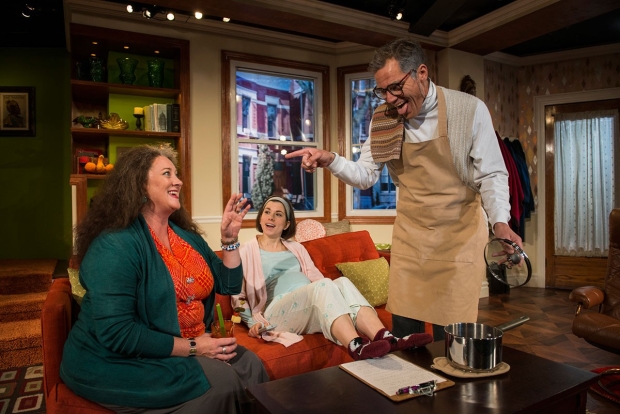Pilgrim's Progress

(© Michael Brosilow)
With theater stalwart-turned-movie-star Michael Shannon in a leading role, Pilgrim’s Progress is one of the toughest tickets to get. Shannon, a cofounder of A Red Orchid Theatre (with Guy Van Swearingen), stars in this world premiere of playwright Brett Neveu's dysfunctional family drama.
Though Shannon might be the marquee draw, Pilgrim's Progress is a showcase for Red Orchid's defining characteristic: A rock solid ensemble of intensely memorable characters. Directed by Shade Murray, the four-person cast creates a nuclear family that's primed for destruction, and tells a story of a Thanksgiving Day so horrific, it makes the doomed Wingfields of The Glass Menagerie look like the Waltons.
The Glass Menagerie is one of many dysfunctional family dramas that Neveu references. Passages from Shakespeare, Beckett, Sam Shepard, and Tracy Letts find their way into the narrative, often during stylized moments when the lights dim and the mood switches from kitchen sink naturalism to eerie soliloquizing.
Like those that came before them, the McKees are a tribe of dark secrets and bizarre traditions. Jim (Shannon) is the manic, menacing, oddball father, a theater professor married to Melissa (Kirsten Fitzgerald), a woman oozing a viscous, swampy sex appeal. The McKee children are Rania (Charlotte Mae Ellison), a pregnant high school senior with a vacant aspect indicative of Post Traumatic Stress Disorder. Her beloved brother, Desmond (Ryan Bourque), is an undergrad majoring in soil science," prone to quoting poems about dirt.
The show's tension comes from Neveu's tautly paced revelations about the extent of the McKee family's warped world view. Their madness is codified in elaborate family "contracts," documents that lay out the rules for everything from social interaction to the use of derogatory nicknames. These documents are a source of pitch-black humor and insight into their wildly inappropriate ways. Some of the contracts are relatively petty: If Jim addresses Melissa with a certain despised nickname three times in a row, she gets to slap him. Some are far weightier: If anyone speaks of the true father of Rania's child, well, suffice to say the consequences are dire. Some are signed in blood, a ritual that is carried out in one harrowing scene so realistic, you'll want to call 911.
Neveu understands that there's nothing unique about a plot centered on an unhappy family. But by making Pilgrim's Progress overtly derivative, he creates a piece that feels original and subversive. You may have seen shades of these characters before, but you've never seen them this hilariously self-aware. Pilgrim's Progress is both an over-the-top parody and a cheeky homage to the long tradition of family tragedies on the stage.
Murray's cast is on fire from start to finish. Shannon is electric, a twitchy amalgam of quirks that range from disarming to potentially lethal. There's equal parts menace and humor to his presence, an unsettling blend of danger and clownishness. Fitzgerald gives a luxuriantly creepy performance as a woman of undeniably sinister maternity and seductive beauty. Bourke's Desmond is utterly believable as the damaged offspring of toxic parents, especially in a scene late in the show when he at first denies, and ultimately collapses under, the truth of an especially rank family secret. Bourke is a marvel in the scene, initially paralyzed by terror and later almost physically caving in under the weight of the awful truth. Ellison is also powerful, but with a Laura Wingfield-like vulnerability which gives way to a steely power that makes everyone else in the family take notice.
Set designer Chelsea Warren's rendition of a nondescript middle-class home captures a façade of ticky-tacky normality while hinting at the malevolent weirdness of the folks who live there. It's an environment of forgettable sofas and kitchen ranges punctuated by knickknacks that include an aggressively phallic gourd sculpture. Mike Durst's lighting design enhances the fractured, often surreal world of the McKees as it swings from everyday realism to hyper-theatrical fantasy.
Odds are your family's gatherings look more like a Norman Rockwell painting compared to the Edvard Munch-like holidays at the McKee's.











